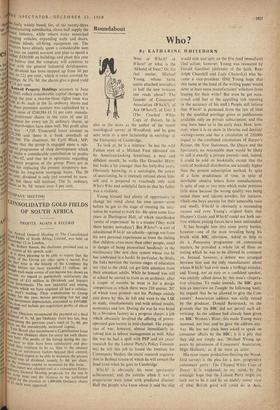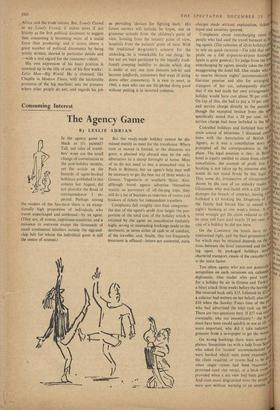Roundabout
Who?
By KATHARINE WHITEHORN To look at, he is a mixture: he has the wild Fabian eyes of a Michael Foot (dimmed out by American-looking hornrims), a neat and diffident mouth; he walks like Grouch° Marx; but looks a lot younger than his forty-five years. Obviously knowing, as a sociologist, the power of questioning, he is intensely reticent about him- self and is prepared to vouchsafe only such Who's Who and unhelpful facts as that his father was a violinist.
Young himself had plenty of opportunity to change his mind about his bwn career—even before he got to the stage of creating the insti- tution he wanted to work for. He spent some four years at Dartington Hall, of which unorthodox 'centre of experiment' he is a trustee ('they work them harder nowadays). But Where?—a sort of educational ll'hich? on schools—springs not from his own personal experiences as from the feeling that children, even more than other people, stand in danger of being pressurised heedlessly in the meritocracy (the new class system whose rise he has celebrated in a book). In particular, he thinks the links between the various stages of education are vital to the child, yet get little attention from their attendant adults. While he himself was still at school he started to train as an architect; after a couple of months he went in for a design competition in which there were 210 entries, 207 of which were printed—not his. Perhaps unduly cast down by this, he left and went to the LSE to study, simultaneously and with mixed results, economics and law. During the war he was hired by a Swindon factory as a progress chaser, a job which obscurely involved the affixing of power- operated gun-turrets in mid-channel. The exigen- cies of war, however, almost immediately in- volved him in labour management as well. After the war he had a spell with PEP and six years' research for the Labour Party's Policy Commit- tee; he left this job to found the Institute for Community Studies, the social research organisa- tion in Bethnal Green of which he will remain the head even when he goes to Cambridge. Whichi~ is obviously his most spectacular achievement; and the months when 'it was in preparation were tense with predicted disaster. Half the people who knew about it said the ship would sink and split on the first (and immediate) libel action; however, Young was reassured by Gerald Gardiner (defender of the faith, Ran- dolph Churchill and Lady Chatterley) who be- came a vice-president. (Did Young hope that this name at the head of the writing paper would deter at least some manufacturers' solicitors from leaping for their writs? But even he got occa- sional cold feet at the appalling risk reposing in the accuracy of his staff.) People still believe that Which? is protected from the law of libel by the qualified' privilege given to publications available only on private subscription; and this may have been so in the early days. Now, how- ever, when it is on show in libraries and dentists' waiting-rooms and has a circulation of 210,000 (equal to the combined circulations of Harper's Bazaar, the New Statesman, the Queen and the Spectator), no reasonable man would be likely to call it exactly a private journal—and, indeed, it could be sold on bookstalls, except that the costs of bookstall distribution are actually higher than the present subscription method. In spite of a faint prudishness of tone, in spite of inevitable abusive letters from manufacturers, in spite of one or two tests which make precious little sense because the wrong quality was being tested (beer and talcum powder, for instance. which one buys anyway for their untestable taste and smell), Which? is obviously a resounding success and even Young's original fears that Shopper's Guide and Which? could not both sur- vive without joining forces have been unfounded.
It has brought him into some pretty battles, however—one of the most revealing being his brush with BBC television. Asked to help to do a Panorama programme on consuming matters, he provided a whole lot of films on testing which he was to be allowed to comment on. Instead, however, a debate was arranged between him and the only manufacturer about whom Which? had ever made a (trifling) mistake; and Young, not an easy or a confident speaker, was entirely talked down by this man's vitupera- tive criticism. To make amends, the BBC gave him an interview on Tonight the following week; his request that he be allowed to give the Con- sumers' Association address was airily vetoed by the producer, Donald Baverstock, on the grounds that the BBC did not permit such ad- vertising. As the address had already been given on BBC Woman's Hour, this made Young more incensed, not less; and he gave the address any- way. He has not since been asked to speak on consumer affairs by the BBC; it is a pity that they did not simply say, 'Michael Young ap- pears by permission of Consumers' Association, High Holborn,' as if he were an actor.
His most recent production (barring the Wood- ford survey) is the plea for a new, progressive consumers' party: The Chipped White Cups of Dover. It is weakened, to my mind, by the nostalgic hope that the Labour Party might yet turn out to be it and by an unduly sunny view' of what British good will could do in Asia, Africa and the trade unions. But, Lonely Crowd or no Lonely Crowd, it makes news if not history as the first political document to suggest that consuming is becoming more of a social force than producing; and it scores above a great number of political documents by being wittily written, shrewd in particular details and —with a real regard for the consumer—short.
His own expression of his basic position is summed up in the title of one of his first works: Little Man—Big World. He is obsessed, like Chaplin in Modern Times, with the intolerable pressures of the big machine; sees the pressure where other people do not; and regards his job as providing 'devices for fighting back.' His future surveys will include, he hopes, one on grammar schools from the children's point of view, housing from the tenants' point of view, hospitals from the patients' point of view. With the traditional do-gooder's concern for the underdog, he is remarkable for one thing: he has not yet been paralysed by the (equally tradi- tional) creeping inability to decide which dog is under at any one time (tenants sub-let and become landlords, consumers find ways of doing down other consumers). It is rare to meet, in 1960, a man who can use the phrase doing good without putting it in inverted commas.



























 Previous page
Previous page